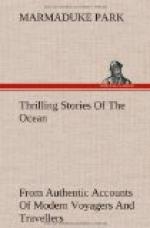The wounded are all taken down into the cock-pit. It will hardly bear thinking about. But in the cockpit were laid out ready for use, wine, water, and surgeon’s instruments, with napkins, basins, sponges, and bandages.
The combined fleets of France and Spain, at Trafalgar, under Villenueve, the French admiral, a brave and skilful man, were in the form of a crescent, and the two British lines ran down upon them parallel to each other. As soon as the British van was within gunshot the enemy opened their fire. The Royal Sovereign soon rounded to under the stern of the Santa Anna, and Admiral Nelson’s ship, the Victory, laid herself on board the Redoubtable. From that moment the roaring of guns, the crash against the sides of the ships, clouds of smoke, splintered yards, and falling masts, were the order of the day.
The death warrant of the navy of France was signed and sealed by the fight of Trafalgar. In the heat of the action, a ball, fired from the mizzen-top of the Redoubtable, struck Admiral Nelson on the left shoulder, when he instantly fell. “They have done for me, at last, Hardy,” said he, to his captain.
Though mortally wounded, he gave some necessary direction concerning the ship, and when carried below inquired earnestly how the battle went on. When he knew that the victory had been gained—for twenty ships in all struck to the British admiral—he expressed himself satisfied. “Now I am satisfied,” said he; “thank God, I have done my duty!” Many times he repeated this expression, and “Thank God I have done my duty;” and “Kiss me, Hardy,” were among the last words that were uttered by his lips. Thus, with a heart full of patriotism, died the bravest commander, the most vigilant seaman, and the most ardent friend of his country, that every led on a British fleet to victory.
[Illustration: Death of Nelson.]
Even amid the exultation of victory, a grateful country mourned his loss. A bountiful provision was made for his family; a public funeral was awarded to his remains, and monuments in the principal cities of his native land were erected to his memory. A sorrowing nation lamented over his bier, and Britania, indeed, felt that old England’s defender was numbered with the dead.
[Illustration: Balboa discovering the Pacific ocean.]
DISCOVERY OF THE PACIFIC OCEAN.
Vasco Nunes de Balboa, a Spaniard, as you see by his name, was born in 1475. He was one of the adventurers who pursued the path which Columbus had pointed out. He led a party of Spaniards, who going out from Darien founded a colony in the neighboring regions. Some gold being found the Spaniards got into a violent quarrel.
[Illustration: The Indian chief disgusted at the Spaniards.]
One of the Indian chiefs being present, was so disgusted at this, that he struck the scales with which they were weighing it so hard with his fist, that the gold was scattered all about.




